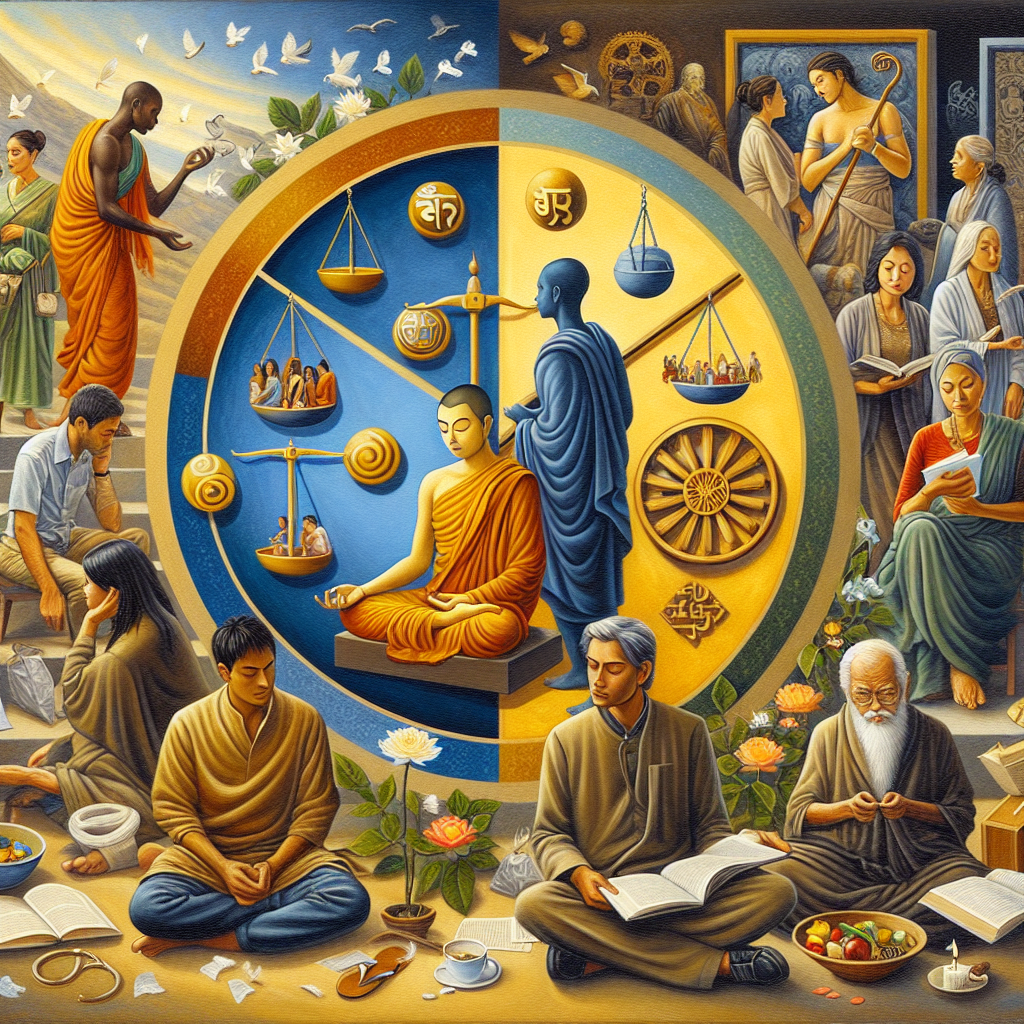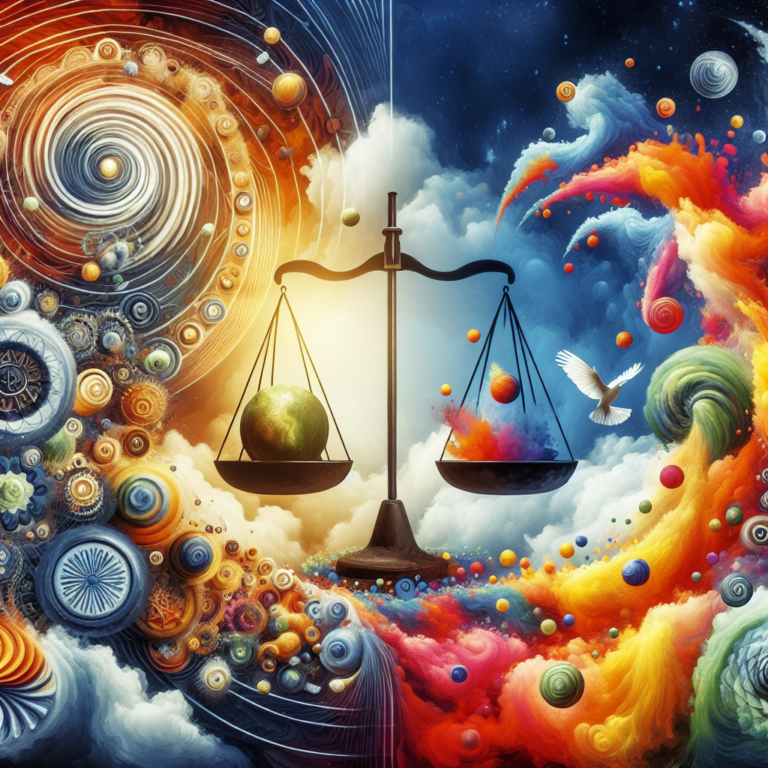Introduction
Dharma is a complex term that carries profound meanings in various religious and philosophical traditions, particularly within Hinduism, Buddhism, Jainism, and Sikhism. While it may seem elusive at first, understanding Dharma is essential for navigating the intricacies of life and cultivating a sense of purpose and direction. This article aims to explore the concept of Dharma, its historical context, its relevance in modern life, and how it can serve as a guide to everyday wisdom.
Origins and Historical Context of Dharma
The term ‘Dharma’ has its roots in Sanskrit, an ancient language of India. The literal translation of Dharma can vary, encompassing meanings such as ‘law,’ ‘duty,’ ‘righteousness,’ and ‘cosmic order.’ It serves as a key concept in the spiritual and ethical frameworks of several Indian religions.
Hinduism
In Hinduism, Dharma is seen as a fundamental principle that upholds social order and moral integrity. It is one of the four aims of human life (Purusharthas), alongside Artha (prosperity), Kama (pleasure), and Moksha (liberation). Each individual’s Dharma, or duty, may vary depending on their age, caste, and stage of life, collectively forming the basis of ethical behavior.
Buddhism
In Buddhism, Dharma (Dhamma in Pali) refers to the teachings of the Buddha. The Dharma encompasses the core principles of Buddhism—such as the Four Noble Truths and the Eightfold Path—which provide guidance on the path to enlightenment. Here, Dharma emphasizes the importance of understanding the nature of suffering and the means to overcome it.
Jainism
Jainism posits Dharma as the ethical path essential for spiritual evolution. It emphasizes non-violence (Ahimsa), truthfulness, and asceticism as integral components of Dharma, guiding practitioners toward liberation (Moksha).
Sikhism
In Sikhism, Dharma aligns with the concept of living truthfully and maintaining high moral standards, emphasizing justice and equality in interactions with others.
The Essence of Dharma
The essence of Dharma transcends religious boundaries and can be understood through the lens of moral and ethical living. At its core, Dharma represents the way of righteousness—acting in harmony with universal laws and principles that govern existence.
Personal Dharma
Personal Dharma refers to the unique path that each individual must take to fulfill their responsibilities and roles in life. It is influenced by circumstances, capacities, and aspirations, requiring self-awareness and reflection. Understanding one’s personal Dharma is integral to finding meaning and purpose, as it allows individuals to align their actions with their higher values.
Societal Dharma
Societal Dharma pertains to the collective responsibilities and ethical obligations of a community or society. It entails upholding fairness, promoting welfare, and ensuring justice. Societal Dharma encourages individuals to recognize their interconnectedness and contribute positively to the world around them.
Dharma in Everyday Life
Incorporating Dharma into daily life is an ongoing journey of self-discovery and ethical living. Here are some ways in which individuals can embody Dharma in their everyday interactions:
Self-Reflection and Awareness
One of the first steps towards understanding and fulfilling Dharma is engaging in self-reflection. This process involves examining one’s values, beliefs, and actions to gain clarity about what is truly important. Mindfulness practices, such as meditation, can aid in developing greater self-awareness, allowing individuals to align their choices with their principles.
Acting with Intention
Every action we take should resonate with our deeper values and aspirations. By acting with intention, individuals can ensure that their everyday decisions contribute to their overall sense of purpose. An intentional approach encourages individuals to act ethically in every situation, enhancing their connection to their Dharma.
Embracing Change and Flexibility
Dharma is not a static concept; rather, it is fluid and adaptable to the changing circumstances of life. Embracing change and being flexible in one’s approach enables individuals to respond effectively to new challenges while remaining true to their core values.
Service to Others
A vital aspect of Dharma is the notion of service (Seva). Engaging in acts of kindness, compassion, and altruism not only benefits others but also enriches one’s own life. Service to others reflects a commitment to societal Dharma, reinforcing the interconnectedness of all beings.
Learning from Mistakes
None of us are perfect, and mistakes are a natural part of life. Approaching errors with a mindset of learning and growth aligns with the principles of Dharma. By acknowledging failures and seeking to improve, individuals can deepen their understanding of righteousness and ethical living.
The Role of Dharma in Relationships
Relationships are fundamental to human experience, and Dharma plays a vital role in fostering nurturing and meaningful connections.
Communication and Honesty
Effective communication is anchored in honesty and transparency. Upholding these values fosters trust and respect, which are essential for any healthy relationship. Dharma encourages individuals to express their thoughts and feelings authentically while remaining considerate of others’ perspectives.
Empathy and Compassion
Dharma urges individuals to practice empathy and compassion in their interactions. By understanding others’ feelings and experiences, individuals can forge stronger bonds and contribute to a more harmonious environment.
Respecting Boundaries
Respecting personal boundaries is integral to nurturing relationships. Recognizing and honoring the needs and limits of others reflects an understanding of their Dharma and cultivates mutual respect.
Dharma and Professional Life
Integrating Dharma into professional life can have a profound impact on career satisfaction and success.
Pursuing Ethical Practices
In the workplace, committing to ethical practices not only enhances personal integrity but also contributes to the overall culture of an organization. Upholding values such as honesty, fairness, and responsibility can inspire others and foster a sense of collective Dharma within the team.
Finding Purpose in Work
Shaping one’s work around personal values and passions can lead to a greater sense of purpose. Aligning career choices with Dharma can help individuals find fulfillment and meaning in their professional lives.
Dharma and Spiritual Growth
The relationship between Dharma and spiritual growth is profound, as understanding and living in alignment with Dharma can facilitate personal and spiritual development.
Exploring Spiritual Practices
Engaging in spiritual practices, such as meditation, yoga, or prayer, can deepen one’s understanding of Dharma and its application. These practices often cultivate virtues such as patience, mindfulness, and compassion, which are intrinsic to the understanding of Dharma.
Connecting with Community
Being part of a supportive community can enhance one’s spiritual journey. Engaging with others who share similar values fosters a sense of belonging and reinforces the commitment to living a life of Dharma.
Conclusion
Understanding and embodying Dharma is a lifelong journey that requires introspection, humility, and commitment. As individuals strive to align their actions with higher principles, they inevitably cultivate wisdom that transcends religious boundaries. The application of Dharma is not limited to lofty ideals; rather, it serves as a practical guide to navigating the complexities of everyday life. By embracing personal and societal Dharma, individuals can contribute to a more harmonious and compassionate world, enriching their own lives in the process.
FAQs
What is the difference between Dharma and karma?
Dharma refers to the ethical code and duties one must follow in life, while karma represents the actions and their consequences that shape one’s future. Essentially, Dharma provides the guiding principles for taking actions, and karma is the outcome of those actions.
Can Dharma change over time?
Yes, Dharma can evolve as individuals grow and their circumstances change. Personal experiences, shifts in values, and new insights can influence what one’s Dharma entails throughout different stages of life.
How do I discover my personal Dharma?
Discovering personal Dharma involves self-reflection, mindfulness practices, and exploring one’s passions and core values. Engaging in activities that resonate with you and introspective practices can provide valuable insights into what your Dharma may be.
Does Dharma vary between cultures and religions?
While the core essence of Dharma may remain consistent, interpretations and applications of Dharma can vary across cultures and religious traditions. Each tradition brings its own historical and contextual nuances to the understanding of Dharma.
, It seems like you may have meant to ask for a specific prompt or topic for writing or discussion. Could you please provide more details about what you’re looking for? Whether it’s a creative writing prompt, a discussion topic, or any other type of prompt, I’d be happy to help!, #Understanding #Dharma #Path #Everyday #Wisdom, #Understanding #Dharma #Path #Everyday #Wisdom, 1734041169, understanding-dharma-the-path-to-everyday-wisdom





